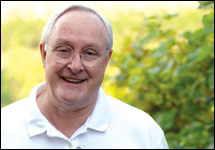MLUI / Articles from 1995 to 2012 / Friends & Neighbors: Don Coe
Friends & Neighbors: Don Coe
 | |
| Gary Howe | |
| Don Coe says that preserving working farms helps build prosperity in both rural communities and urban areas. |
INSTITUTE: What’s the connection you see between Northwest Michigan’s landscape and economy?
DON COE: The economy depends on the landscape because it attracts both residents and visitors. We know our customers enjoy visual, performing, and culinary arts and value the environment. This area has these in spades.
INSTITUTE: How does the Leelanau Farmland Preservation campaign, which the Institute is helping to lead, support our lifestyle and livelihoods?
DC: We are losing almost eight acres a day of Leelanau County farmland, which we cannot afford. Everything in agriculture starts with land, so we need to ensure that new farmers can afford to buy land, while established growers can get some cash to expand their
farming into more profitable niche
markets. Farmland preservation is
really a financing mechanism. It’s no gift: farmers are selling an asset—
their development rights—and permanently committing land to its best use: growing crops, not houses. Farmland preservation programs work in neighboring communities and other states, so there’s every reason to believe they would work here as well. There is no alternative other than the public
supporting farmland preservation.
INSTITUTE: How has the Institute’s Taste the Local Difference campaign affected northwest Lower Michigan?
DC: It has really raisied people’s awareness of the amount and variety of food grown here and the size of its potential market. The program is linking growers, producers, and retailers; making us more self sufficient; and sending a clear message that, working together, growers can develop farm-to-table systems and build our economic future.
INSTITUTE: Why are you, as a grower, living in downtown Traverse City?
DC: Living in Midtown is wonderful. We have all the services of a regional center, particularly access to our lawyer, our accountant, and our banks. I get more done in a half-hour morning walk to my service agencies and then driving 12 miles out to the farm than I’d ever accomplish on the farm itself.
INSTITUTE: How has Traverse City changed recently?
DC: We’re developing elements that ensure that Traverse City grows and retains our younger population. We need more year round, well paid jobs and more affordable housing for young families. That’s happening with some of the New Urbanist designs, particularly with high-density developments that include affordable housing. Now we need zoning for today, not for someone’s perception of the past. We’re in a knowledge-based economy and need downtown offices integrated with residential neighborhoods.
INSTITUTE: What are Northwest Michigan’s greatest challenges?
DC: The lack of regional planning
and the high cost of multiple individual units of government that show little cooperation or regional planning. That makes the Land Use and Transportation Study group crucial. We have an opportunity to be an example to the rest of the country by staving off those elements of development that harm our charm and embracing smart, regional planning that enhances our assets. We don’t have to
be victims of urban sprawl.
INSTITUTE: How does the Institute fit in?
DC: The Institute is an educational vehicle, bringing forward best practices, forming community coalitions, and encouraging people to work together towards some common goals. What
you do well is listen and reason.
You don’t come to a situation with
a preconceived opinion or a sense that other people are wrong. You seem to be willing to listen to people, help identify best practices, and try to convince
people without being dogmatic and
simply getting people involved.
INSTITUTE: Where can we improve?
DC: As you grow, remember those founding principles. You can’t do everything yourself; you have to always build coalitions, which requires a sense of humility rather than aggressively trying to capture the high ground.





